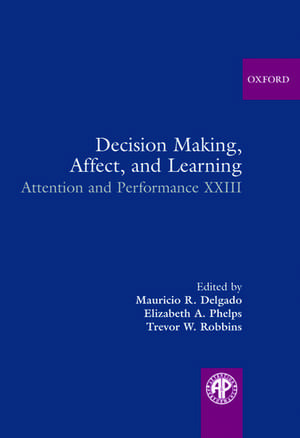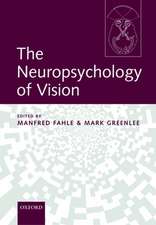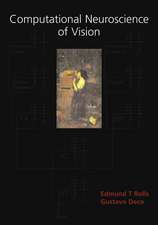Decision Making, Affect, and Learning: Attention and Performance XXIII: Attention and Performance Series
Editat de Mauricio R. Delgado, Elizabeth A. Phelps, Trevor W. Robbinsen Limba Engleză Hardback – 23 mar 2011
Preț: 1092.37 lei
Preț vechi: 1650.87 lei
-34% Nou
Puncte Express: 1639
Preț estimativ în valută:
209.05€ • 215.96$ • 173.98£
209.05€ • 215.96$ • 173.98£
Carte tipărită la comandă
Livrare economică 14-20 martie
Preluare comenzi: 021 569.72.76
Specificații
ISBN-13: 9780199600434
ISBN-10: 0199600430
Pagini: 576
Dimensiuni: 181 x 247 x 28 mm
Greutate: 1.17 kg
Ediția:New.
Editura: OUP OXFORD
Colecția OUP Oxford
Seria Attention and Performance Series
Locul publicării:Oxford, United Kingdom
ISBN-10: 0199600430
Pagini: 576
Dimensiuni: 181 x 247 x 28 mm
Greutate: 1.17 kg
Ediția:New.
Editura: OUP OXFORD
Colecția OUP Oxford
Seria Attention and Performance Series
Locul publicării:Oxford, United Kingdom
Recenzii
Review from previous edition Reviews from previous editions 'The Attention and Performance series has unfailingly presented the best work in the field'
'The most distinguished series in the field of cognitive psychology.'
'Held in high esteem throughout the field because of its attention to rigor, quality, and scope... indispensable to anyone who is serious about understanding the current state of the science.'
'The standard of Attention and Performance is very high. It is fully peer-reviewed, and attracts high citation, almost certainly higher than for any other book series in the field. Effectively it is regarded as an international journal and one of high repute it's a must for all serious research departments to have in their library'
'This is the most prestigious and highly regarded series of edited volumes on cognitive psychology that exist in the field. Each volume has described research at the cutting edge, and there have been numerous A & P citation classics.'
'Over the years Attention and Performance has been the premier series of edited books in the general field of cognitive science many of the most important methods and theories in these fields have been introduced first in Attention and Performance.'
'The volumes always include contributions from the leaders in the field covered by the particular symposium.'
'The most distinguished series in the field of cognitive psychology.'
'Held in high esteem throughout the field because of its attention to rigor, quality, and scope... indispensable to anyone who is serious about understanding the current state of the science.'
'The standard of Attention and Performance is very high. It is fully peer-reviewed, and attracts high citation, almost certainly higher than for any other book series in the field. Effectively it is regarded as an international journal and one of high repute it's a must for all serious research departments to have in their library'
'This is the most prestigious and highly regarded series of edited volumes on cognitive psychology that exist in the field. Each volume has described research at the cutting edge, and there have been numerous A & P citation classics.'
'Over the years Attention and Performance has been the premier series of edited books in the general field of cognitive science many of the most important methods and theories in these fields have been introduced first in Attention and Performance.'
'The volumes always include contributions from the leaders in the field covered by the particular symposium.'
Notă biografică
Mauricio Delgado is the Principal Investigator of the Social and Affective Neuroscience Lab in the Department of Psychology at Rutgers University. His research program focuses on understanding the behavioral and neural influences that positive and negative reinforcers have on our ability to learn, adapt and make sound choices. The lab uses functional magnetic resonance imaging (fMRI) in conjunction with physiological and behavioral measures to obtain converging information aimed at addressing questions such as: 1) How does the human brain learn about value? 2) How does it use this information to make decisions and guide behavior during (a) basic processes, such as instrumental conditioning (learning a particular choice will lead to a desired outcome) and (b) more complex social interactions which are integral to everyday behavior; 3) How do we control or regulate our expectations and emotional responses to cope with simple and complex decisions?Elizabeth A. Phelps received her PhD from Princeton University in 1989, served on the faculty of Yale University until 1999, and is currently the Silver Professor of Psychology and Neural Science at New York University. Her laboratory has earned widespread acclaim for its groundbreaking research on how the human brain processes emotion, particularly as it relates to learning, memory and decision-making. Dr. Phelps is the recipient of the 21st Century Scientist Award from the James S. McDonnell Foundation and a fellow of the American Association for the Advancement of Science and the Society for Experimental Psychology. She has served on the Board of Directors of the Association for Psychological Science and the Society for Neuroethics, was the President of the Society for Neuroeconomics and is the current editor of the APA journal Emotion.Trevor Robbins was appointed in 1997 as the Professor of Cognitive Neuroscience at the University of Cambridge. He was elected to the Chair of Expt. Psychology (and Head of Department) at Cambridge from October 2002. He is also Director of the newly-established Cambridge MRC Centre in Behavioural and Clinical Neuroscience, the main objective of which is to inter-relate basic and clinical research in Psychiatry and Neurology for such conditions as Parkinson's, Huntington's, and Alzheimer's diseases, frontal lobe injury, schizophrenia, depression, drug addiction and developmental syndromes such as attention deficit/hyperactivity disorder. He is a Fellow of the British Psychological Society, the Academy of Medical Sciences and the Royal Society, the U.K. National Academy of Science. He has been President of the European Behavioural Pharmacology Society (1992-1994) and he won that Society's inaugural Distinguished Scientist Award in 2001.














